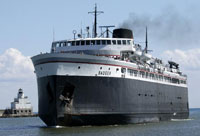
Photo: Mark Hoffman
The SS Badger is a 410-foot long coal-fired passenger and vehicle ferry operating in Lake Michigan on a four hour shuttle service between Ludington, Michigan, and Manitowoc, Wisconsin. She began sailing in 1953 and is the last coal-fired passenger vessel operating on the Great Lakes. To her admirers, she is a national treasure, while to her detractors, she is an environmental menace that dumps more than 4 tons of toxic coal ash into Lake Michigan daily. The Badger has been operating on an EPA waiver since 2008 that allows it to continue dumping ash. That waiver runs out on December 19, 2012.
As reported by the New York Times, the supporters of the Badger have managed to get language to allow her to continue operation indefinitely included in a bill to continue funding the US Coast Guard.
Buried in a Coast Guard reauthorization bill now in final negotiations between the House and the Senate is curious language saying a “qualified vessel” shall continue to operate for its entire lifetime, “without regard to any expiration dates” on the permit it operates on. Nowhere does the word “Badger” appear, and nowhere is the expiration date of Dec. 19, 2012, noted.
But the enumerated qualifications — including that it be nominated for or on the list of National Historic Landmarks — apply to only one vessel, the Badger, a 60-year-old ship with a look torn from an old postcard and a permit to operate, coal ash and all, that expires next month. Republicans supposedly put an end to special-interest language slipped into bills to benefit projects or employers in their districts when they took control of the House last year.
And the sponsors of that language, two Republican representatives, Tom Petri of Wisconsin and Bill Huizenga of Michigan, say it is not an earmark because it does not mandate the expenditure of any money.
“I don’t see that as an earmark in any way, shape or form because there is no transfer of anything of value,” Mr. Huizenga said.
Others disagree.
“If it walks like an earmark and talks like an earmark, it’s an earmark,” said Senator Richard J. Durbin, Democrat of Illinois, who has done battle with the Badger’s owner. “I’m not going to let that language go through.”
Many do not support the extension. Earlier this year the Milwaukee Journal Sentinel opined – SS Badger ferry owners have had enough time.
Four years ago, the owners of the SS Badger ferry said they would look for ways to switch from coal to another power source for the ferry and hoped to make the changes this year, according to the federal Environmental Protection Agency. Nothing has happened, and now the owners are asking for more time and for a permit that would keep it operating as is, which includes dumping 500 tons of coal ash into Lake Michigan every year.
We say no. Four years should have been sufficient time for the owners to find a way around the problem – switching to diesel engines, storing the ash on board, something – and now it’s time for some accountability.
Yesterday the Journal Sentinel reported:
But others question whether even one ship on the Great Lakes should be engaged in burning coal and dumping the ash into the waters.
That includes Aaron Schultz, a spokesman for the Badger’s Milwaukee-based competitor, Lake Express ferry, who pointed out that the Badger was given four years to become compliant by either coming up with a way to retain the ash or to burn a cleaner fuel such as diesel.
“It’s a permanent exemption for coal ash, and we don’t believe it’s good policy,” Schultz said of the special provision.
Milwaukee Mayor Tom Barrett said it was unfair to have different rules for the two vessels.
“There should be one set of environmental rules for ferries crossing Lake Michigan,” Barrett said in a statement. “Congress should not exempt the SS Badger, nor should it allow that boat to continue dumping thousands of tons of coal ash into Lake Michigan.”
The owners of the Badger minimize the threat from the ash being dumped in the lake, equating the coal ash with “harmless sand”. Opponents, however, note that :
Coal ash typically contains heavy metals including arsenic, lead, mercury, cadmium, chromium and selenium. Exposure to these heavy metals can cause heart damage, lung disease, respiratory distress, kidney disease and reproductive problems, among other health issues.
Coal Ash: Hazardous to Human Health
Thanks to Phil Leon and Ulrich Rudofsky for contributing to this post.

Pingback: SS Badger, National Treasure or Environmental Menace, Earmark or Reasonable Exception? | Chuck Hill's CG Blog
This is plain out and out greed. They could have switched to an environmentally friendly fuel such as LPG long ago. This would have cost money and this company has a history of trying have someone else pay. . But dumping toxic material in the drinking water source for millions of people is ok.
If the Badger is federally permitted, I believe it would have to comply with the Sec’y of the Interior’s standards for restoration of historic vessels which probably requires very careful consideration of any major changes to the power plant under the oversight of the National Park Service.
The problem is that the Badger is operating as a commercial vessel so she really should follow the current rules for commercial vessels. If she was operated only as a historic vessel she would have a separate set of rules different regulatory agencies to please. Right now the owners are trying to straddle the rules in order to avoid upgrading the vessel and to continue dumping toxic ash into Lake Michigan.